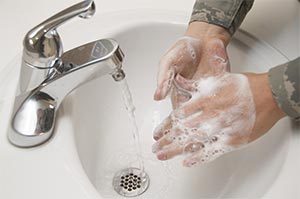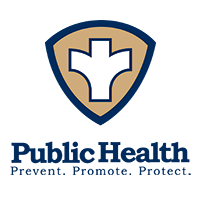News & Information
Please select a year.
National Handwashing Week - December 3-9, 2017
National Handwashing Week - December 3-9, 2017
Keeping hands clean through improved hand hygiene is one of the most important steps we can take to avoid getting sick and spreading germs to others. Many diseases and conditions are spread by not washing hands with soap and clean, running water.
When Should I Wash My Hands?

- Before, during, and after preparing food
- Before eating food
- Before and after caring for someone who is sick
- Before and after treating a cut or wound
- After using the toilet
- After changing diapers or cleaning up a child who has used the toilet
- After blowing your nose, coughing, or sneezing
- After touching an animal, animal feed, or animal waste
- After handling pet food or pet treats
- After touching garbage
How Should I Wash My Hands?
What if I don't have soap and clean, running water?
In most situations, washing hands with soap and water is the best way to reduce the number of germs on them. If soap and water are not available, use an alcohol-based hand sanitizer that contains at least 60% alcohol. Alcohol-based hand sanitizers can quickly reduce the number of germs on hands in some situations, but sanitizers do not eliminate all types of germs and might not remove harmful chemicals. Hand sanitizers are not as effective when hands are visibly dirty or greasy.
How do you use hand sanitizers?
Caution! Swallowing alcohol-based hand sanitizers can cause alcohol poisoning. Keep it out of reach of young children.
Health Promotion Materials
https://www.cdc.gov/handwashing/resources.html 
Below you will find a variety of resources to help you learn more about keeping hands clean and preventing illnesses. There are some great posters, e-cards, and videos to put on your municipal website to increase the public's awareness about the importance of handwashing. Such a simple act can greatly prevent the spread of illness.
CDC Materials
-
Fact Sheets(https://www.cdc.gov/handwashing/fact-sheets.html
 )
)
Printable fact sheets on handwashing-related topics - Posters(https://www.cdc.gov/handwashing/posters.html
 )
)
Printable posters about handwashing-related topics for public display - Social Media(https://www.cdc.gov/handwashing/social-media.html
 )
)
Messages about handwashing to share on social media channels, web buttons, and e-cards - Videos(https://www.cdc.gov/handwashing/videos.html
 )
)
Handwashing videos for adults and kids
The Sussex County Office of Public Health Nursing offers handwashing education in your municipality.
Interactive programs are geared to school-aged and preschool- aged children. Call if you would like to schedule a program at a school or child care center in your municipality.
Sussex County Office of Public Health Nursing, 201 Wheatsworth Road, Hamburg, NJ 07419
Phone: 973-579-0570 x 1211


